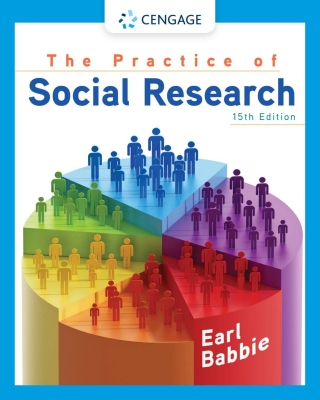Buy The Practice of Social Research, 15th Edition PDF ebook by author Earl R. Babbie – published by Cengage Learning in 2021 and save up to 80% compared to the print version of this textbook. With PDF version of this textbook, not only save you money, you can also highlight, add text, underline add post-it notes, bookmarks to pages, instantly search for the major terms or chapter titles, etc.
You can search our site for other versions of the The Practice of Social Research, 15th Edition PDF ebook. You can also search for others PDF ebooks from publisher Cengage Learning, as well as from your favorite authors. We have thousands of online textbooks and course materials (mostly in PDF) that you can download immediately after purchase.
Note: e-textBooks do not come with access codes, CDs/DVDs, workbooks, and other supplemental items.
eBook Details:
Full title: The Practice of Social Research, 15th Edition
Edition: 15th
Copyright year: 2021
Publisher: Cengage Learning
Author: Earl R. Babbie
ISBN: 9780357360842, 9780357360842
Format: PDF
Description of The Practice of Social Research, 15th Edition:
Known as the gold standard for research methods, Babbie’s THE PRACTICE OF SOCIAL RESEARCH gives you a definitive guide to research as practiced by social scientists. Combining a straightforward approach with the author’s renowned sense of humor, this reader-friendly text equips you with the tools and knowledge to apply research concepts as both researcher and consumer. The author emphasizes the process by showing you how to design and construct projects, introducing the various observation modes in use today and answering critical questions about research methods, such as how to conduct online surveys and analyze both qualitative and quantitative data. The 15th Edition includes the latest General Social Survey findings along with new coverage of the global use of social research, the emerging role of big data, demographic analysis and more.Important Notice: Media content referenced within the product description or the product text may not be available in the ebook version.
Table of Contents of The Practice of Social Research, 15th Edition PDF ebook:
A Note from the AuthorDedicationContents in BriefContens in DetailBoxed FeaturesPrefaceAcknowledgmentsA Letter to Students from This BookChapter 1: Human Inquiry and ScienceIntroductionWhat do you think?Looking for RealityThe Foundations of Social ScienceSome Dialectics of Social ResearchWhat do you think?…RevisitedChapter 2: Paradigms, Theory, and ResearchIntroductionWhat do you think?Some Social Science ParadigmsElements of Social TheoryTwo Logical Systems RevisitedDeductive Theory ConstructionInductive Theory ConstructionThe Links between Theory and ResearchThe Importance of Theory in the “Real World”Research Ethics and TheoryWhat do you think?…RevisitedChapter 3: The Ethics and Politics of Social ResearchIntroductionWhat do you think?Ethical Issues in Social ResearchTwo Ethical ControversiesThe Politics of Social ResearchWhat do you think?…RevisitedChapter 4: Research DesignIntroductionWhat do you think?Three Purposes of ResearchIdiographic ExplanationThe Logic of Nomothetic ExplanationNecessary and Sufficient CausesUnits of AnalysisThe Time DimensionMixed ModesHow to Design a Research ProjectThe Research ProposalWhat do you think?…RevisitedThe Ethics of Research DesignChapter 5: Conceptualization, Operationalization, and MeasurementIntroductionMeasuring Anything That ExistsWhat do you think?ConceptualizationDefinitions in Descriptive and Explanatory StudiesOperationalization ChoicesCriteria of Measurement QualityWhat do you think?…RevisitedThe Ethics of MeasurementChapter 6: Index, Scales, and TypologiesIntroductionWhat do you think?Indexes versus ScalesIndex ConstructionScale ConstructionTypologiesWhat do you think?…RevisitedChapter 7: The Logic of SamplingIntroductionWhat do you think?A Brief History of SamplingNonprobability SamplingThe Logic and Techniques of Probability SamplingPopulations and Sampling FramesTypes of Sampling DesignsMultistage Cluster SamplingProbability Sampling in ReviewThe Ethics of SamplingWhat do you think?…RevisitedChapter 8: ExperimentsIntroductionTopics Appropriate for ExperimentsWhat do you think?The Classical ExperimentSelecting SubjectsVariations on Experimental DesignExamples of ExperimentationWeb-Based Experiments”Natural” ExperimentsStrengths and Weaknesses of the Experimental MethodEthics and ExperimentsWhat do you think?…RevisitedChapter 9: Survey ResearchIntroductionTopics Appropriate for Survey ResearchWhat do you think?Guidelines for Asking QuestionsQuestionnaire ConstructionSelf-Administered QuestionnairesInterview SurveysTelephone SurveysOnline SurveysMixed-Mode SurveysComparison of the Different Survey MethodsStrengths and Weaknesses of Survey ResearchSecondary AnalysisWhat do you think?…RevisitedEthics and Survey ResearchChapter 10: Qualitative Field ResearchIntroductionWhat do you think?Topics Appropriate for Field ResearchSpecial Considerations in Qualitative Field ResearchSome Qualitative Field Research ParadigmsConducting Qualitative Field ResearchStrengths and Weaknesses of Qualitative Field ResearchEthics in Qualitative Field ResearchWhat do you think?…RevisitedChapter 11: Unobtrusive ResearchIntroductionWhat do you think?Content AnalysisAnalyzing Existing StatisticsComparative and Historical ResearchUnobtrusive Online ResearchEthics and Unobtrusive MeasuresWhat do you think?…RevisitedChapter 12: Evaluation ResearchIntroductionWhat do you think?Topics Appropriate for Evaluation ResearchFormulating the Problem: Issues of MeasurementTypes of Evaluation Research DesignsSocial Indicators ResearchEthics and Evaluation ResearchWhat do you think?…RevisitedChapter 13: Qualitative Data AnalysisIntroductionLinking Theory and AnalysisWhat do you think?Qualitative Data ProcessingComputer Programs for Qualitative DataThe Qualitative Analysis of Quantitative DataEvaluating the Quality of Qualitative ResearchEthics and Qualitative Data AnalysisWhat do you think?…RevisitedChapter 14: Quantitative Data AnalysisIntroductionQuantification of DataWhat do you think?Univariate AnalysisSubgroup ComparisonsBivariate AnalysisIntroduction to Multivariate AnalysisSociological DiagnosticsEthics and Quantitative Data AnalysisWhat do you think?…RevisitedChapter 15: The Logic of Multivariate AnalysisIntroductionWhat do you think?The Origins of the Elaboration ModelThe Elaboration ParadigmElaboration and Ex Post Facto HypothesizingWhat do you think?…RevisitedChapter 16: Social StatisticsIntroductionDescriptive StatisticsWhat do you think?Inferential StatisticsOther Multivariate TechniquesWhat do you think?…RevisitedChapter 17: Reading and Writing Social ResearchIntroductionReading Social ResearchWhat do you think?Writing Social ResearchThe Ethics of Reading and Writing Social ResearchWhat do you think?…RevisitedAppendixe A: Using the LibraryAppendixe B: Random NumbersAppendixe C: Distribution of Chi SquareAppendixe D: Normal Curve AreasAppendixe E: Estimated Sampling ErrorGlossaryBibliographyIndex





